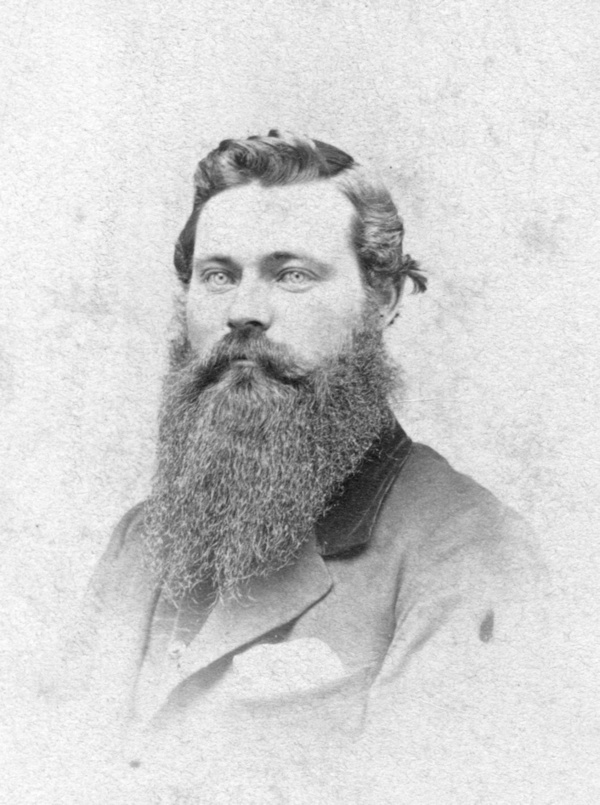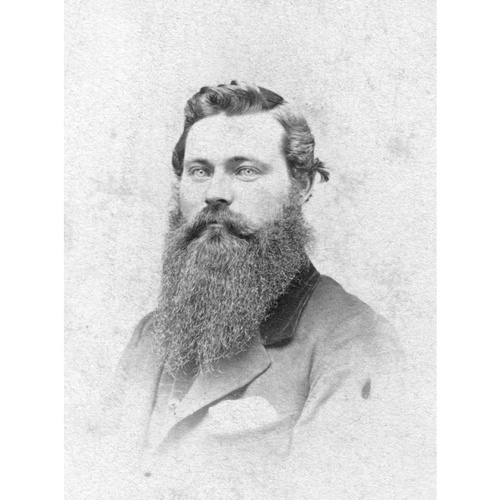
Source: Link
McKELLAR, JOHN, prospector, businessman, and politician; b. 10 June 1833 in Mosa Township, London District, Upper Canada, eldest son of Duncan McKellar and Margaret Brodie; d. unmarried 3 Feb. 1900 in Fort William (Thunder Bay), Ont.
The first years of John McKellar’s life were spent in Mosa Township which, before the building of the Great Western Railway, was virtually a wilderness. The lack of local schools meant that his education was acquired entirely at home; from his parents, immigrants from Argyllshire, Scotland, he also learned a powerful sense of family. He derived an enthusiasm for mining exploration as he listened to his father’s tales of travel to Lake Superior in 1839–40. At the age of 20 John set out for the north with his father and brother Peter. Then, in 1855, the entire family moved to Ontonagon, in the northern Michigan copper fields. But the American Civil War posed problems for a Canadian family with four sons of military age, and searching for copper on the north shore of Lake Superior suddenly became attractive. Again, in 1863, John, Peter, and their father set out for new country; the rest of the family followed within the next five years. By 1866 the family holdings in mineral lands had reached 6,000 acres. Moreover, in spite of the opposition of the Hudson’s Bay Company, John, with the support of his cousin, Archibald McKellar, mla for Kent, was successful in his petition for the grant of a farm of 175 acres on the Kaministikwia River. On it was built in 1868 the house where John McKellar was to live for the rest of his life; on it too, within that lifetime, was to rise the downtown section of the town of Fort William.
The McKellar Brothers partnership (John, Peter, and Donald) had been established almost as soon as they had arrived north of Superior, and the list of copper, silver, gold, and lead mining properties they discovered and developed is impressive. Among these were the Caribou and Arctic mines near Black Bay (1872), the Victoria Cape mine on Jackfish Bay (1873), and the Little Pic copper-mine (1875). Most of the properties, if they proved to be productive, were sold to American interests. All the brothers were deeply involved in exploration and mining promotion; it was John, with Donald, who was credited with the discovery of barite on McKellar Island (near Cloud Bay), zinc deposits near McKay’s Harbour (Rossport), and iron ore at Atikokan.
Although John McKellar’s local reputation in the 1870s was as an explorer of mining property, after his father’s death in 1875 he became the central and relatively stationary representative of family interests, more and more identified with the community in which he lived. He was a staunch supporter of St Andrew’s Church (Presbyterian) and of the Liberal party. From 1873 until his resignation for reasons of ill health at the end of 1898, he was the elected representative of his community on various municipal bodies. At first he sat on the council of the municipality of Shuniah, set up in 1873 and including all the townships then surveyed in the vicinity of Thunder Bay, as well as the only village, Prince Arthur’s Landing (later Port Arthur). The interests of the people living on the Kaministikwia were by no means identical with those of the village, and McKellar became the consistent spokesman for the river interests. Indeed, it was generally said that he and Thomas Marks each made annual pilgrimages to Ottawa to make sure the other would not secure an advantage. In 1881 the township of Neebing, in which the so-called McKellar Ward was located, withdrew from Shuniah, as did Port Arthur (Thunder Bay) when it was incorporated as a town three years later, Marks becoming its first mayor.
But the uneasy relationship between the neighbouring communities continued. It was McKellar, as head of a locally powerful family, who in the 1880s negotiated the sale of part of its farm to the Canadian Pacific Railway, and so prepared the way for the company’s investment in elevators, warehouses, and coal-docks on the river. By 1891 the CPR had decided to make Fort William a divisional point and to build its shops there. As a result McKellar, by then reeve of Neebing, witnessed a rapid escalation in local property values. Port Arthur’s enraged town council pinned its hopes on an electric-railway scheme to preserve the town core by providing transportation to the new jobs opening up in the McKellar Ward. To fight this plan, or to modify it in such a way that his community could benefit, McKellar led the campaign for the incorporation of the town of Fort William. In 1892 he became its first mayor, retaining the position for more than six years.
When McKellar died in 1900, he left all of his property to his two surviving brothers. Two years later a sister, Mary, laid the cornerstone for the John McKellar Memorial Hospital (now McKellar General Hospital) on land donated by the family. For some residents of the pioneer community, John McKellar had already come to symbolize a triumph in the never-ending dispute with Port Arthur. Peter McKellar, however, listed John’s achievements somewhat differently, noting his contribution to the prosperous development of the district as a whole and then to the establishment of the town of Fort William, and recollecting his ability to remove himself from the financial worries of his youth. Both family and community – to John McKellar the distinction was somewhat blurred – saw him as a towering figure who defied the elements and, in his early days, the power of the fur barons. In the recollection of another member of Fort William’s first town council, Harry Sellers, he assumed, as well as elected office, an unofficial magisterial status, settling local disputes in an era before, as McKellar himself put it, “we had parsons and lawyers come to live amongst us.”
[Primary sources concerning John McKellar are fragmentary and remain for the most part in private hands. Selected items held by descendants of two of his sisters, including various business papers, interviews with family members, and copies of Peter McKellar’s diaries, have been photocopied and form part of the collection of the Thunder Bay Hist. Museum Soc. (Thunder Bay, Ont.). The letters of Peter McKellar at Lakehead Univ. Library Arch. (Thunder Bay), 271, deal chiefly with his Geological Survey experiences, in which John did not share. Except for John McKellar’s official and sterile correspondence as mayor, none of his letters have been found. The local newspapers consulted (cited below) are extremely biased and must be used with great care. e.a.]
City of Thunder Bay Records Centre and Arch. (Thunder Bay), Towns of Port Arthur and Fort William [Thunder Bay], council minutes. NA, MG 28, III 20. Ont., Dept. of Crown Lands, Report (Toronto). Thunder Bay district, 1821–1892: a collection of documents, ed. and intro. [M.] E. Arthur (Toronto, 1973). Daily Sentinel (Prince Arthur’s Landing, later Port Arthur [Thunder Bay]), 22 Feb. 1882–29 April 1893. Daily Times-Journal (Fort William), 1899–1902. Fort William Journal, 1887–99. Weekly Herald and Algoma Miner (Port Arthur), 1882–99. Weekly Sentinel (Port Arthur), 29 July 1875–27 Dec. 1895. E. M. Henderson, The McKellar story; McKellar pioneers in Lake Superior’s mineral country, 1839 to 1929 (Thunder Bay, 1981). Harry Sellers, “Some reminiscences of early days in Fort William,” Thunder Bay Hist. Soc., Papers (Fort William), 1917: 19–20.
Cite This Article
Elizabeth Arthur, “McKELLAR, JOHN,” in Dictionary of Canadian Biography, vol. 12, University of Toronto/Université Laval, 2003–, accessed April 7, 2025, https://www.biographi.ca/en/bio/mckellar_john_12E.html.
The citation above shows the format for footnotes and endnotes according to the Chicago manual of style (16th edition). Information to be used in other citation formats:
| Permalink: | https://www.biographi.ca/en/bio/mckellar_john_12E.html |
| Author of Article: | Elizabeth Arthur |
| Title of Article: | McKELLAR, JOHN |
| Publication Name: | Dictionary of Canadian Biography, vol. 12 |
| Publisher: | University of Toronto/Université Laval |
| Year of revision: | 1990 |
| Access Date: | April 7, 2025 |



